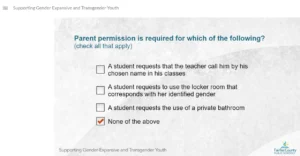Fairfax Parents Excluded From Kids’ Gender Issues
A Conversation Between a Pre-Teen and Teacher
Recently, twelve-year-old Sam approached a teacher at his Fairfax County public school, and this conversation occurred:
Sam: Miss Jones, I sometimes wonder whether I’m really a girl, trapped in a boy’s body.
Jones: When did you start feeling that way?
Sam: A while ago, but last week, when you asked me to fill out a form with my preferred pronouns, I realized I’m thinking of myself as a “she” named Sue.
Jones: Sam … I mean Sue … that happens to a lot of kids when they reach your age. At birth, every baby gets a particular gender designation, but we can’t determine their real gender until later.
Sam: That makes me feel better.
Jones: Have you told your parents about this?
Sam: No, I don’t know how they’d react.
Jones: Don’t worry. We will help you keep it a secret. Under our policy, you can use one name and gender designation in school, but we will call you Sam in communications with your parents, and we won’t tell them if you choose to use the girls’ bathrooms or locker rooms.
Sam: Really?
Jones: Yes, Fairfax County school policy requires all teachers and school employees to support what you’ve just told me, and we will help you to transition from male to female.
Really?!
Does this scenario reflect the policy of Fairfax County Public Schools? Should a child’s expression of gender dysphoria be automatically accepted and affirmed by school officials? Should a teen’s skittishness about sharing his or her feelings with his or her parents prevail over the parents’ primary responsibility and concern for the welfare of their child? Do public employees believe they have the right to exclude parents from such an important issue affecting the physical and mental development of their children? Do county employees think they are in a better position than parents to understand what might be causing a child to experience gender dysphoria, and in a better position to provide for the counselling and care that the child might need?
A child’s questioning of his or her gender identity doesn’t necessarily mean that his or her “true” gender differs from his or her biological gender. The dysphoria might be caused by a traumatic experience, by something the child has seen or read, by the grooming behavior of individuals or groups who teach that gender is an artificial concept, arbitrarily “assigned at birth,” or by other factors. The child might naturally grow out of the feelings, or might resolve them after proper counselling by parents or others. Why, then, should a school system automatically accept a child’s expression as an established fact, to be supported and nourished, without any parental involvement?
In 2021 a candidate for Virginia governor declared that “parents shouldn’t tell teachers what to teach.” He paid the price for that arrogant comment. Telling parents that they should let teachers decide how to deal with gender dysphoria would be even more outrageous.
Moreover, Virginia law explicitly provides that “a parent has a fundamental right to make decisions concerning the upbringing, education, and care of the parent’s child.” Va. Code §1-240.1. A child’s confusion about his or her gender unquestionably implicates his upbringing, education and care. Thus, parents have a “fundamental right” to be involved. School administrators cannot lawfully keep parents in the dark.
What Is the Policy of Fairfax County Public Schools?
Does the discussion above accurately reflect the policy of the Fairfax County public school system? The answer is unclear.
The issue recently came to light when the content of a mandatory teacher training program was disclosed. In a program entitled “Supporting Gender Expansive and Transgender Youth,” teachers were told the following:

Thus, the authors of the training program obviously believe that parental involvement isn’t required. And since all teachers are being given this instruction, it presumably does reflect the School Board’s intent.
But the official policy upon which the training is based isn’t quite so clear. Regulation 2603.2, updated in April 2022, specifies how issues regarding “gender-expansive and transgender students” are to be handled within the school system. The text of the regulation is HERE.
The regulation states at the outset that school employees should not disclose information about a student’s gender status, “including to other school personnel who do not have a need to know, unless the student has authorized the disclosure, or unless legally required to do so as further outlined below.” Confidentiality from parents isn’t specifically stated, and much of the remainder of the regulation assumes that parents will be involved. For example, Section IV states that “schools shall accept a student or parent’s assertion of a student’s gender-expansive or transgender status.” When made aware of a gender-identity issue, “the school shall offer to convene a support team for the student or the parents.” “Every effort shall be made to encourage and support communication between [the student] and the student’s parents.” Thus, the regulation is somewhat ambiguous as to whether a school should keep parents in the dark when a student is reluctant to disclose his or her gender dysphoria.
The School Board’s Counsel (John Foster) and/or Superintendent (Michelle Reid) should promptly clarify this issue. Hopefully, the school system will publicly state that the regulation should not be interpreted to allow parents to be excluded from such important information and decision-making regarding their children, and teachers should be told that the recent training program was erroneous. It would be an outrageous interference with parental responsibilities and rights for the school system to support alteration of a student’s gender identity without the knowledge of the parents. It would also violate Virginia law, which provides that parents have a “fundamental right” to be involved in such an important matter.
If the school system does not negate the recent teacher training, the policy should be challenged in court by parents with children in Fairfax County Public Schools and/or by parent advocacy groups. And voters should be well informed about this issue in the 2023 school board elections.
If you find this article to be informative and useful, please share it with others, and encourage them to register to receive future posts on this site.



Good points. Thanks for writing this and for getting the word out about what really is happening in Fairfax County schools
This is beyond disturbing. Thanks,Mark, for monitoring the school policies. It makes me sad & angry to see the overstep of the County.
Thank you for reporting the truth. I was impeached as the PTA Vice President on Tuesday because I handed out copies of the gender related FCPS “students rights” page from the handbook a couple of weeks ago. I even got called to the principal’s office. They will do everything they can to stop parents from talking about these policies with each other.
I think that the document that governs the mandatory policy for these issues at the state level also needs to be examined in detail. The law that references it is vague and allows VDOE to write a regulation, and the actual document appears to suggest similar policies are in place across the state.